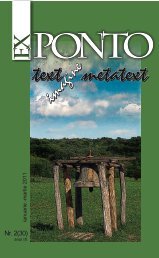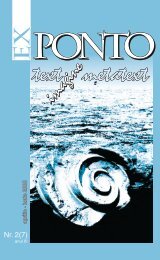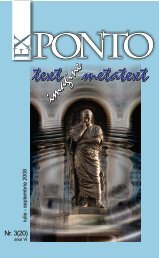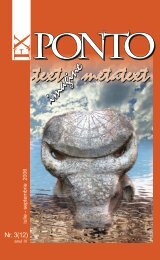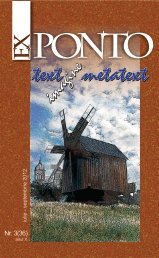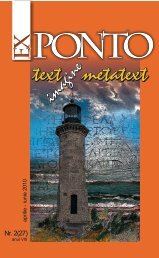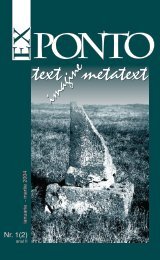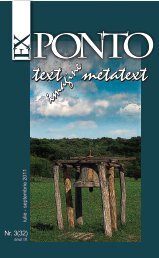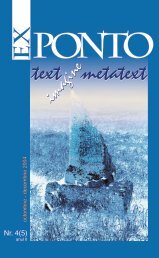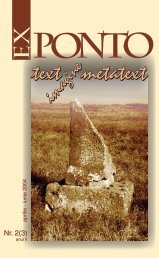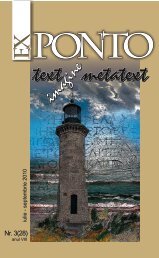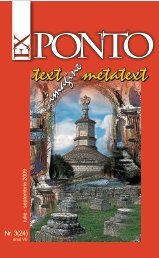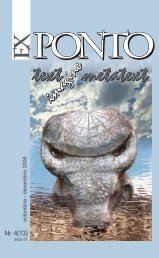Nr. 2 (19) anul VI / aprilie-iunie 2008 - ROMDIDAC
Nr. 2 (19) anul VI / aprilie-iunie 2008 - ROMDIDAC
Nr. 2 (19) anul VI / aprilie-iunie 2008 - ROMDIDAC
You also want an ePaper? Increase the reach of your titles
YUMPU automatically turns print PDFs into web optimized ePapers that Google loves.
culture dimension is still there in this evaluation – since imagining the lines<br />
as potential lyrics means to operate with the pop culture concepts of the<br />
rock band, its songs and the words to those songs – but it is now refined<br />
by certain formal aspects that do not consist of any strict rules but rather of<br />
some intuitive and pragmatic guidelines that may be applied to or recognized<br />
in certain poetic pieces.<br />
Such a loose formalism is present also in rock poetry not also as potential<br />
or actual rock lyrics but also as poetry on/ inspired by rock. We have already<br />
looked into David Wojahn’s sonnets and analyzed the free uninhibited way in<br />
which he tackles the form by fusing it with rock, rock culture and various other<br />
ingredients. In the other poets we have briefly scanned we have also noted<br />
such concerns with certain formal aspects – not always strictly or consistently<br />
and very rarely in a standard handbook of prosody fashion – that actually<br />
mirror a certain loose and unconventional, sometimes completely innovating<br />
and improvisational formalism in rock music itself. Such a loose formalism –<br />
or better, for certain poetries, heterodox formalism – would involve, besides<br />
personal treatment of a fixed form (the above mentioned case of Wojahn, or<br />
Dana Gioia’s ‘quasi-ballade’ in Elledge p 163-164), the cunning use of pararhymes<br />
(hence a sort of loose rhyming) and liberal employment of rhythm as<br />
for instance accentual verses with alternating number of beats (very much<br />
blues and rock like) or various feet concatenated with little or no consideration<br />
to measure.<br />
I have tried to applied such criteria myself to poems that have not been<br />
recommended before as rock poems and I will just present here one of my<br />
significant results and its implications. Gregory Corso has never been quoted<br />
or anthologized to my knowledge as a rock poet or an author of poetry about<br />
rock or inspired by rock and roll. As a Beat he has been sometimes naturally<br />
mentioned in connection with jazz, just as the Beat movement as a whole<br />
has been associated with that music, in his case an association that seemed<br />
so much natural as he also sometimes gave some riveting poetry readings<br />
on stage. Still, once in a while, the effect on the audience during his readings<br />
was rather paralleled to the impact of rock bands live rather than jazz, as I<br />
have discovered in <strong>19</strong>94 New York Times article for instance:<br />
The audience at Town Hall on Thursday night punctuated the performance by<br />
applauding, laughing and shouting requests. There wasn't a rock band on stage, though,<br />
just a jovially disheveled, white-maned, 64-year-old poet, Gregory Corso.<br />
(Pareles 13)<br />
Ex Ponto nr.2, <strong>2008</strong><br />
And then again in a New York Times article Stephen Holden comments<br />
upon the formative influence of the Beats on certain outstanding figures of<br />
rock music and on rock culture in general. But Holden refers only to the “Beat<br />
generation literary trilogy” (Holden 39) of Jack Kerouac, William Burroughs<br />
and Allen Ginsberg who as the author argues set a “fervent, iconoclastic tone<br />
for younger generation” (idem) and especially for legendary figures like Bob<br />
Dylan, Patti Smith and Lou Reed who are “still carrying on the Beats’ mission<br />
of crying out from the urban wilderness” (idem).<br />
Besides the fact that Corso is not included in such an analysis, the question<br />
under discussion is the impact of the Beats on certain rock artists and poets, i.e.<br />
lyrics writers, whereas what I have in view here is the possibility to read certain<br />
established or (at least professional) poets’ poetries, particularly Corso’s, as<br />
128




